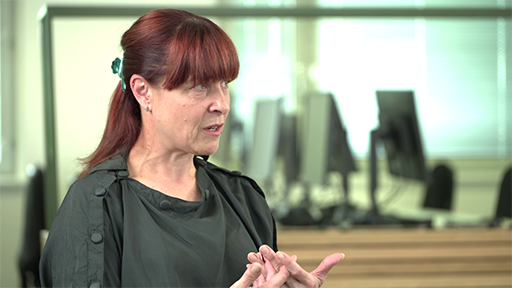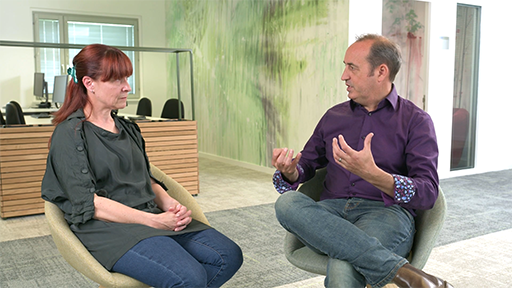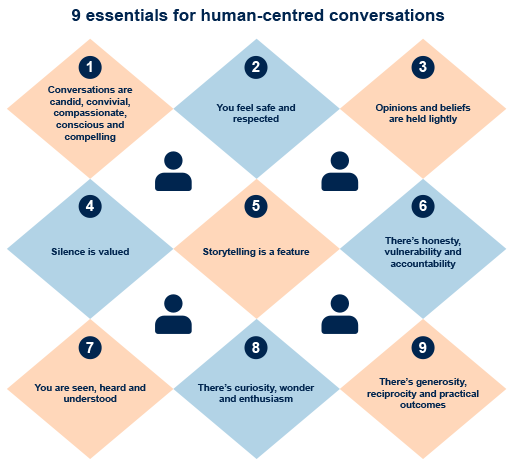3.4 Conversations about wellbeing
Effective leaders recognise the need to embed wellbeing and inclusion throughout the different levels of an organisation. Leaders and managers can help to build an inclusive and supportive culture of psychological safety in which staff feel able to share their experiences and needs in the workplace.
The conversations you have about wellbeing are an important aspect of enabling and modelling behaviours that support workplace wellbeing. Conversations about personal or sensitive matters require you to build trust, to be honest about the support you/the organisation can provide, and to use your judgement for agreeing next steps. While there is always a need to consider how much should be shared, taking a more empathetic approach, and using active listening can lead to better conversations.
Empathy and active listening are explored in more depth in the Hybrid working: skills for leadership [Tip: hold Ctrl and click a link to open it in a new tab. (Hide tip)] course that is part of this collection. That course may be useful in helping you develop your awareness and skills in taking a human-centred approach (Berry, 2022) when talking to others. In Figure 7 Berry suggests 9 essentials for human-centred conversations:
Many organisations have appropriate networks in place to support both employees and line manager to start to have better conversations. In this final activity we focus on bringing together the learnings from the course and ask you to reflect on how you feel about personal conversations and explore how you might share your own experiences (as an individual), and approach sensitive conversations (as a leader or manager), to support your staff and develop more effective workplace support.
Activity 6 Better conversations
Having conversations about personal matters in the workplace can be difficult. As an individual you may not be ready to share what might be happening in your life, for many reasons, and as a manager you may not know how to start a conversation with a member of staff to ask if something is wrong. Often it is only at the point where something ‘happens’ – such as behaviour that is out of character, poor performance or unexpected absence – that starting a sensitive conversation becomes unavoidable.
Feeling able to openly share a personal experience in the workplace can take time, and often only happens once the individual has first spoken to close friends or family, then to trusted work colleagues, and eventually to their line manager. In the case study below, we use the example of miscarriage to help you consider how you might approach sensitive conversations at work.
Case study: miscarriage and the workplace
There is increasing evidence that the COVID-19 pandemic has had a significant impact on progress in gender equality. You can explore issues affecting women in the section on Inclusion considerations for females in the Hybrid working: organisational development course within this collection.
Women’s health issues linked to fertility are common, be these difficulties conceiving, complications during and after pregnancy, or menopause. Miscarriage is a sensitive subject because the societal norm in the UK is not to disclose that you are pregnant before 12 weeks, yet many miscarriages happen in the very early stages of pregnancy. This can lead to people going through a grieving process that others are not aware of. The Tommy’s National Centre for Miscarriage Research works with universities and hospitals and is dedicated to understanding more about the reasons for, impact of and prevention of miscarriages. Research by Tommy’s has suggested that both women and their partners have experienced post-traumatic stress disorder (PTSD) around miscarriage:
At nine months, none of the women with healthy pregnancies had PTSD, anxiety, or depression. But among women with early pregnancy loss:
- almost one in five (18%) had PTSD
- one in six (17%) had anxiety
- one in 20 (6%) had depression.
Farren J, Jalmbrant M, Falconieri N, et al, 2020
In video below Esther Spring, Learning Lead - Digital and Innovation, and Dr Nick Barratt, Director, Learning and Discovery Services at The Open University, discuss her experience of miscarriage and the support she received in the workplace.
As you watch the video consider how you might approach a similar situation, and what support your organisation has in place. It could be helpful to think about how you feel, listening to what Esther experienced, as being aware of how you might feel and react could influence how you approach similar conversations in the future. Then consider Nick’s reflections of the experience, at the end of the video.
Trigger warning: Please note that this video discusses the process and impact of miscarriage in detail.

Transcript
Having watched the video, and considering Nick’s reflections, how might you approach sensitive conversations, and what support issues might you encounter in a hybrid or remote-only workplace? You may wish to make notes in the box below:
In the next video Nick and Esther discuss how organisations and managers can support their staff in relation to wellbeing and inclusion. Consider the different approaches that could be taken, and the impact that situations could have on both individuals and managers. As you watch the video reflect on your own and your organisation’s approach to wellbeing and inclusion and consider what you could do differently.

Transcript
You may wish to make notes in the text box below about areas for further research, and conversations with others that could be beneficial to develop better working practices.
The following resources may be helpful, if this a topic you wish to explore further:
- Fertility Network (fertilitynetworkuk.org)
- Fertility and causes of infertility | Tommy's (tommys.org)
- Miscarriage and the workplace - The Miscarriage Association
- Baby loss information and support | Tommy's (tommys.org)
- menopausesupport.co.uk – Supporting You Through Change
- The Menopause Charity - Menopause Facts, Advice and Support
- Home – Mental Health At Work

